-

新人教版高中英语必修3Unit 5 The Value of Money- Discovering Useful Structure教学设计
Step 3 Meaning1. 过去将来时表示从过去某一时间来看将要发生的动作或存在的状态, 常用在宾语从句中。一般由“would/should +动词原形”构成。She hoped that they would meet again someday. 她希望将来有一天他们能再见面。2. was/were going to+动词原形: 表示过去将要发生或很有可能发生的动作, 常用于口语中, 表示预言、意图或者打算等。He was going to start work the following week. 他打算下星期开始工作。3. was/were about to do: 常用来表示即将发生的动作, “刚要/正要做……”。注意该结构不与任何时间状语连用。I felt that something terrible was about to happen. 我感到某种可怕的事情即将发生。4.was/were to do: 表示“曾计划做某事”, 如果表示“本来计划做某事, 动作没实现”, 则需用 “was/were to have done”。She said she was to have told me about the accident. 她说她本来想告诉我关于事故的事。5.Start, go, come, leave, see, meet等动词的过去进行时: 表示就过去某一时刻而言即将发生的动作。She was coming later. 她随后就来。I had just put on my overcoat and was leaving to visit a friend of mine. 我刚穿上外套要去看我的一个朋友。

新人教版高中英语必修3Unit 5 The Value of Money-Listening &Speaking教学设计
Step 4: Listen again and decide if the following statements are true (T) or false (F).1 It was the first time Chen Liyan's story was reported. T口 F口2 Chen found 10,000 yuan in a small plastic bag in Taiyuan railway station口 F口3 Wang Zheng apologized to Chen because he couldn't offer her more money. T口 F口4 Chen took out a large loan to cure her daughter, T口 F口5 Wang set up a fundraising website for Chen's daughter after Chen told him about her situation. T口 F口Step 5:After listening, discuss the questions.1 What kind of person do you think Chen Liyan is?Chen Liyan is generous and honest because she returned a large sum of money to the owner.2 Did Chen return the money because she didn't need it?No. She returned the money because it was the right thing to do. Evidence for this is that she refused to accept the reward money because she felt that it had not been earned. 3 Is it common for people to do what Chen did?It depends on the culture. In some countries it is quite common to return money that has been found. In other countries, people believe "Finders are keepers!" 4 How did Wang Zheng feel about the return of his money?He must have been very happy and relieved to have gotten his money back. We know this because he thanked Chen repeatedly and even offered her a reward.5 Why did Ma Dongbao tell Wang about Chen's family?He must have had great sympathy for Chen and her daughter and wanted to help them.'We know this because he arranged help for them. 6 How did the news reporter feel about Chen's actions?The news reporter felt that it showed that money wasn't the most important thing in life. We know this because the reporter told us that this is what Chen believes. and then said, “that's a great attitude to take."

新人教版高中英语必修3Unit 5 The value of money-Reading and Thinking教学设计二
? Could you offer me some kind of work here?? I don’t want your charity, I just want an honest job.? Careless: I landed in Britain by accident.Step 7:Consolidation.? Find Henry? Roderick and Oliver were I .making a bet when they saw Henry, a poor young man. ? Know Henry? About a month ago, Henry was sailing and later he found himself carried out to sea by a strong wind. Fortunately, he 2.was spotted by a ship. And it was the ship that brought him to 3.England? Offer money to Henry ? Oliver and Roderick gave Henry a letter and told him that there was money in it. They 4.persuaded him to accept it, and made him 5.promise that it wouldn't be opened until 2 o'clock.Step 8:Language pointsa large amount of: a large quantity of; a great deal ofe.g. They bought a large amount of furniture before they moved their new house.make a bet: make an arrangement to risk money, etc. on an event of which the result is doubtful.e.g. We made a bet on the result of the match.permit sb to do something: allow somebody to do somethinge.g. My mother doesn’t permit me to ride in the street after it rained.by accident: as a result of chancee.g. I only found it by accident.stare at: look at somebody or something with the eyes wide open in a fixed gaze( in astonishment, wonder, fear, etc)to be honest: to tell you the truth; to be franke.g. To be honest, I don’t think we have a chance of winning.Step7 Homework:What do you think will happen to Henry? Will the bank-note help him or get him into trouble?

新人教版高中英语必修3Unit 5 The Value of Money-Reading for Writing教学设计二
2. 您能看到, 我头发太长了。You can see that my hair is much too long.3. 无论什么时候, 只要您想回来就回来。Please come back whenever you want.4. 您仅有很少的头发要理! You only have too little hair to cut !5. 为您服务是我的荣幸!It is my honour to serve you!Step 9 Writing(Henry is walking down the street when he sees a sign for a place that cuts hair. He decides to have it cut. )H=Henry B=BarberH: Good afternoon, I’d like to have my hair cut, if I may. (The barber looks at Henry’s hair and continues cutting another man’s hair. ) Er, I’d really like a haircut. As you can see it’s much too long. B: (in a rude manner) Yes, I can see that. Indeed, I can. H: Fine, well, I’ll have a seat then. (He sits in one of the barber’s chairs. The barber turns to look at Henry. )B: It’s quite expensive here, you know! Are you sure you can afford it?H: Yes. I think so. (After his hair is cut, the barber tells Henry how much he must pay. Henry shows the barber the bank note. )B: Why Mr. . . (looks shocked)H: Adams. Henry Adams. I’m sorry. I don’t have any change. B: Please don’t worry! (wearing a big smile) Nothing to worry about! Nothing at all! Please come back whenever you want, even if you only have too little hair to cut! It will be my honour to serve you!Step 10 Pair workExchange drafts with a partner. Use this checklist to help your partner revise his/her draft.1. Are all the elements of a play included and in good order ?2. Do the character use suitable language ?3. Are the stage directions clear and useful ?4. Is the plot clear and exciting enough ?

新人教版高中英语选修2Unit 4 Journey Across a Vast Land教学设计
当孩子们由父母陪同时,他们才被允许进入这个运动场。3.过去分词(短语)作状语时的几种特殊情况(1)过去分词(短语)在句中作时间、条件、原因、让步状语时,相当于对应的时间、条件、原因及让步状语从句。Seen from the top of the mountain (=When it is seen from the top of the mountain), the whole town looks more beautiful.从山顶上看,整个城市看起来更美了。Given ten more minutes (=If we are given ten more minutes), we will finish the work perfectly.如果多给十分钟,我们会完美地完成这项工作。Greatly touched by his words (=Because she was greatly touched by his words), she was full of tears.由于被他的话深深地感动,她满眼泪花。Warned of the storm (=Though they were warned of the storm), the farmers were still working on the farm.尽管被警告了风暴的到来,但农民们仍在农场干活。(2)过去分词(短语)在句中作伴随、方式等状语时,可改为句子的并列谓语或改为并列分句。The teacher came into the room, followed by two students (=and was followed by two students).后面跟着两个学生,老师走进了房间。He spent the whole afternoon, accompanied by his mom(=and was accompanied by his mom).他由母亲陪着度过了一整个下午。

新人教版高中英语选修2Unit 1 Science and Scientists-Learning about Language教学设计
Step 7: complete the discourse according to the grammar rules.Cholera used to be one of the most 1.__________ (fear) diseases in the world. In the early 19th century, _2_________ an outbreak of cholera hit Europe, millions of people died. But neither its cause, 3__________ its cure was understood. A British doctor, John Snow, wanted to solve the problem and he knew that cholera would not be controlled _4_________ its cause was found. In general, there were two contradictory theories 5 __________ explained how cholera spread. The first suggested that bad air caused the disease. The second was that cholera was caused by an _6_________(infect) from germs in food or water. John Snow thought that the second theory was correct but he needed proof. So when another outbreak of cholera hit London in 1854, he began to investigate. Later, with all the evidence he _7_________ (gather), John Snow was able to announce that the pump water carried cholera germs. Therefore, he had the handle of the pump _8_________ (remove) so that it couldn't be used. Through his intervention,the disease was stopped in its tracks. What is more, John Snow found that some companies sold water from the River Thames that __9__________________ (pollute) by raw waste. The people who drank this water were much more likely _10_________ (get) cholera than those who drank pure or boiled water. Through John Snow's efforts, the _11_________ (threaten) of cholera around the world saw a substantial increase. Keys: 1.feared 2.when 3. nor 4.unless 5.that/which 6.infection 7.had gathered 8.removed 9.was polluted 10.to get 11. threat

新人教版高中英语选修2Unit 1 Science and Scientists-Reading and thinking教学设计
Step 5: After learning the text, discuss with your peers about the following questions:1.John Snow believed Idea 2 was right. How did he finally prove it?2. Do you think John Snow would have solved this problem without the map?3. Cholera is a 19th century disease. What disease do you think is similar to cholera today?SARS and Covid-19 because they are both deadly and fatally infectious, have an unknown cause and need serious public health care to solve them urgently.keys:1. John Snow finally proved his idea because he found an outbreak that was clearly related to cholera, collected information and was able to tie cases outside the area to the polluted water.2. No. The map helped John Snow organize his ideas. He was able to identify those households that had had many deaths and check their water-drinking habits. He identified those houses that had had no deaths and surveyed their drinking habits. The evidence clearly pointed to the polluted water being the cause.3. SARS and Covid-19 because they are both deadly and fatally infectious, have an unknown cause and need serious public health care to solve them urgently.Step 6: Consolidate what you have learned by filling in the blanks:John Snow was a well-known _1___ in London in the _2__ century. He wanted to find the _3_____ of cholera in order to help people ___4_____ it. In 1854 when a cholera __5__ London, he began to gather information. He ___6__ on a map ___7___ all the dead people had lived and he found that many people who had ___8____ (drink) the dirty water from the __9____ died. So he decided that the polluted water ___10____ cholera. He suggested that the ___11__ of all water supplies should be _12______ and new methods of dealing with ____13___ water be found. Finally, “King Cholera” was __14_____.Keys: 1. doctor 2. 19th 3.cause 4.infected with 5.hit 6.marked 7.where 8.drunk 9.pump 10.carried 11.source 12.examined 13.polluted 14.defeatedHomework: Retell the text after class and preview its language points

新人教版高中英语选修2Unit 2 Bridging Cultures-Discovering useful structures教学设计
The grammar of this unit is designed to review noun clauses. Sentences that use nouns in a sentence are called noun clauses. Nominal clauses can act as subject, object, predicate, appositive and other components in compound sentences. According to the above-mentioned different grammatical functions, nominal clauses are divided into subject clause, object clause, predicate clause and appositive clause. In this unit, we will review the three kinds of nominal clauses. Appositive clauses are not required to be mastered in the optional compulsory stage, so they are not involved.1. Guide the students to judge the compound sentences and determine the composition of the clauses in the sentence.2. Instruct students to try to learn grammar by generalizing grammar rules, controlling written practice, and semi-open oral output.3. Inspire the students to systematize the function and usage of noun clause1.Instruct students to try to learn grammar by generalizing grammar rules, controlling written practice, and semi-open oral output.2.Inspire the students to systematize the function and usage of noun clauseStep1: The teacher ask studetns to find out more nominal clauses from the reading passage and udnerline the nominal clauses.

新人教版高中英语选修2Unit 3 Food and Culture-Discovering useful structures教学设计
The newspaper reported more than 100 people had been killed in the thunderstorm.报纸报道说有一百多人在暴风雨中丧生。(2)before、when、by the time、until、after、once等引导的时间状语从句的谓语是一般过去时,以及by、before后面接过去的时间时,主句动作发生在从句的动作或过去的时间之前且表示被动时,要用过去完成时的被动语态。By the time my brother was 10, he had been sent to Italy.我弟弟10岁前就已经被送到意大利了。Tons of rice had been produced by the end of last month. 到上月底已生产了好几吨大米。(3) It was the first/second/last ... time that ...句中that引导的定语从句中,主语与谓语构成被动关系时,要用过去完成时的被动语态。It was the first time that I had seen the night fact to face in one and a half years. 这是我一年半以来第一次亲眼目睹夜晚的景色。(4)在虚拟语气中,条件句表示与过去事实相反,且主语与谓语构成被动关系时,要用过去完成时的被动语态。If I had been instructed by him earlier, I would have finished the task.如果我早一点得到他的指示,我早就完成这项任务了。If I had hurried, I wouldn't have missed the train.如果我快点的话,我就不会误了火车。If you had been at the party, you would have met him. 如果你去了晚会,你就会见到他的。

人教版高中历史必修3西方人文主义思想的起源说课稿
苏格拉底把装有毒酒的杯子举到胸口,平静地说:“分手的时候到了,我将死,你们活下来,是谁的选择好,只有天知道。”说毕,一口喝干了毒酒。(2) 苏格拉底临死前对一个叫克力同的人说了这样一番话。克力同,我告诉你,这几天一直有一个神的声音在我心中晓喻我,他说:“苏格拉底,还是听我们的建议吧,我们是你的卫士。不要考虑你的子女、生命或其他东西胜过考虑什么是公正。……事实上你就要离开这里了。当你去死的时候,你是个牺牲品,但不是我们所犯错误的牺牲品,而是你同胞所犯错误的牺牲品。但你若用这种可耻的方法逃避,以错还错,以恶报恶,践踏你自己和我们订立的协议合约,那么你伤害了你最不应该伤害的,包括你自己、你的朋友、你的国家,还有我们。到那时,你活着面对我们的愤怒,你死后我们的兄弟、冥府里的法律也不会热情欢迎你;因为它们知道你试图尽力摧毁我们。别接受克力同的建议,听我们的劝告吧。”
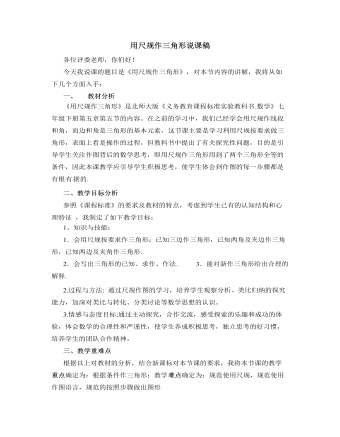
北师大版初中七年级数学下册用尺规作三角形说课稿
《用尺规作三角形》是北师大版《义务教育课程标准实验教科书.数学》七年级下册第五章第五节的内容。在之前的学习中,我们已经学会用尺规作线段和角,而边和角是三角形的基本元素,这节课主要是学习利用尺规按要求做三角形,表面上看是操作的过程,但教科书中提出了有关探究性问题,目的是引导学生关注作图背后的数学思考,即用尺规作三角形用到了两个三角形全等的条件,因此本课教学应引导学生积极思考,使学生体会到作图的每一步骤都是有根 有 据的.二、教学目标分析参照《课程标准》的要求及教材的特点,考虑到学生已有的认知结构和心理特征 ,我制定了如下教学目标:1、知识与技能:1.会用尺规按要求作三角形:已知三边作三角形,已知两角及夹边作三角形,已知两边及夹角作三角形.2.会写出三角形的已知、求作、作法. 3.能对新作三角形给出合理的解释.
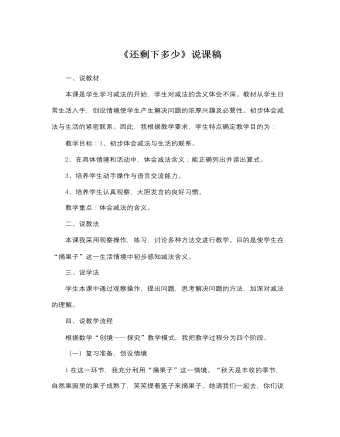
北师大版小学数学一年级上册《还剩下多少》说课稿
教学目标:1、初步体会减法与生活的联系。2、在具体情境和活动中,体会减法含义;能正确列出并读出算式。3、培养学生动手操作与语言交流能力。4、培养学生认真观察,大胆发言的良好习惯。教学重点:体会减法的含义。二、说教法本课我采用观察操作,练习,讨论多种方法交进行教学。目的是使学生在“摘果子”这一生活情境中初步感知减法含义。三、说学法学生本课中通过观察操作,提出问题,思考解决问题的方法,加深对减法的理解。四、说教学流程根据数学“创境——探究”教学模式,我把教学过程分为四个阶段。(一)复习准备,创设情境l在这一环节,我充分利用“摘果子”这一情境。“秋天是丰收的季节,自然果园里的果子成熟了,笑笑提着篮子来摘果子。她请我们一起去,你们说好吗?那我们出发吧!这样学生的好奇心一下子被调动起来渡到第二阶段。
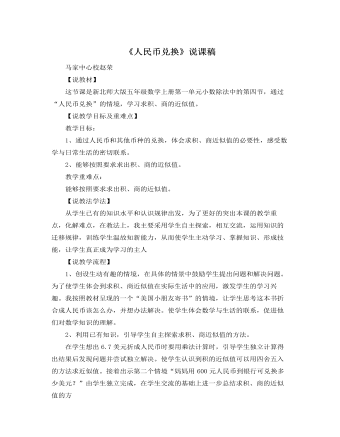
北师大版小学数学五年级上册《人民币兑换》说课稿
2、利用已有知识,引导学生自主探索求积、商近似值的方法。在学生想出6.7美元折成人民币时要用乘法计算时,引导学生独立计算得出结果后发现问题并尝试独立解决。使学生认识到积的近似值可以用四舍五入的方法求近似值。接着出示第二个情境“妈妈用600元人民币到银行可兑换多少美元?”由学生独立完成,在学生交流的基础上进一步总结求积、商的近似值的方法:积取近似值是先精确计算,在根据题目的要求取近似值;商取近似值是直接根据要求多除一位,然后取近似值。3、巩固练习在学生初步掌握求积、商的近似值的方法后,我安排了教材67页的试一试,让学生体会如何按要求取近似值;教材68页的练一练,涉及到了多个国家的货币与人民币的兑换使学生进一步感受到数学与日常生活的密切联系
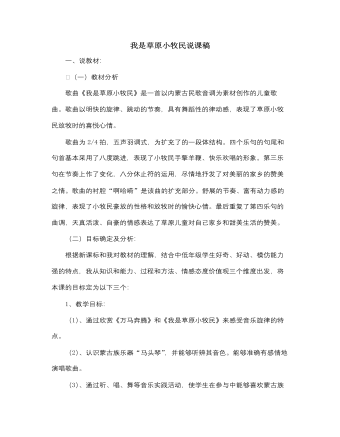
人音版小学音乐三年级上册我是草原小牧民说课稿
4、读歌词:老师带领同学有感情的朗读两边歌词。5、解决难点:二分音符和附点四分音符的节奏练习。6、教师范唱歌曲:7、学生演唱歌曲:老师找出学生唱的不准确的地方。8、教师指导学生演唱:通过老师和学生的对比唱来改正学生的错误。9、师生接唱。10、男女生接唱。师:歌词中说到我是草原小牧民,手拿扬鞭多自豪!那么我们在唱这首歌的时候应该用怎样的情绪呢?11、学生齐唱歌曲 :(三)、拓展部分:1、观看课件蒙古族的民俗:师:同学们这是一首蒙古族的民歌,同学们对蒙古族有哪些了解呢?2、欣赏《筷子舞》:师:可以看出蒙古族是一个能歌善舞的民族,让我们一起来欣赏一段具有蒙古族代表的舞蹈《筷子舞》吧!3、师表演筷子舞:师:同学们看老师给你们带来了什么?生:筷子。师:老师还给同学们准备了一段筷子舞想看吗?那就给老师点掌声吧!
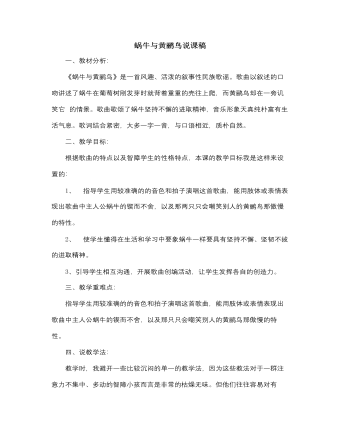
人音版小学音乐二年级上册蜗牛与黄鹂鸟说课稿
a.模仿老师一句一句地,有节奏地读歌词,注意老师手上的木鱼敲打的节奏。b.和老师一起把歌词读一遍,注意强调切分节奏的读法。c.学习歌曲:第一遍,老师一句一句地教学生唱,同时用电子琴弹出旋律。第二遍,老师一边一句一句地教唱,一边做出舞蹈动作,学生在下面模仿。d.学生听老师的电子琴伴奏,齐唱歌曲。2.歌曲演唱:演唱a.“有请我们班的小歌星子喻同学为我们演唱好不好?”b.“我们来组个乐团,怎么样?” c. “那我们的乐团起什么名字好呢?”“叽叽喳喳合唱团。”d. “现在老师宣布,我们的叽叽喳喳合唱团正式开演!”小结:“今天老师很高兴和同学们一起学习《蜗牛与黄鹂鸟》这首歌曲,老师看到了同学们的精彩表演,心里非常感动。在这里,老师希望同学们今后要像蜗牛一样,在学习上或者是生活上,不管遇到什么困难都勇敢面对,克服困难,坚持到底!同学们加油!
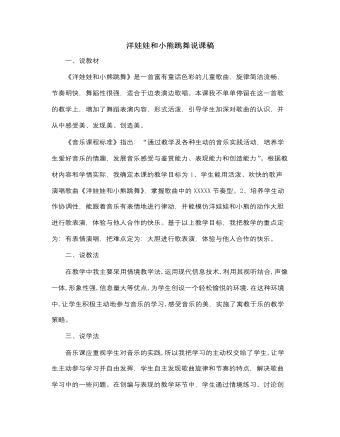
人音版小学音乐二年级上册洋娃娃和小熊跳舞说课稿
《洋娃娃和小熊跳舞》是一首富有童话色彩的儿童歌曲,旋律简洁流畅,节奏明快,舞蹈性很强,适合于边表演边歌唱。本课我不单单停留在这一首歌的教学上,增加了舞蹈表演内容,形式活泼,引导学生加深对歌曲的认识,并从中感受美、发现美、创造美。《音乐课程标准》指出:“通过教学及各种生动的音乐实践活动,培养学生爱好音乐的情趣,发展音乐感受与鉴赏能力、表现能力和创造能力”。根据教材内容和学情实际,我确定本课的教学目标为1、学生能用活泼、欢快的歌声演唱歌曲《洋娃娃和小熊跳舞》,掌握歌曲中的XXXXX节奏型。2、培养学生动作协调性,能跟着音乐有表情地进行律动,并能模仿洋娃娃和小熊的动作大胆进行歌表演,体验与他人合作的快乐。基于以上教学目标,我把教学的重点定为:有表情演唱,把难点定为:大胆进行歌表演,体验与他人合作的快乐。
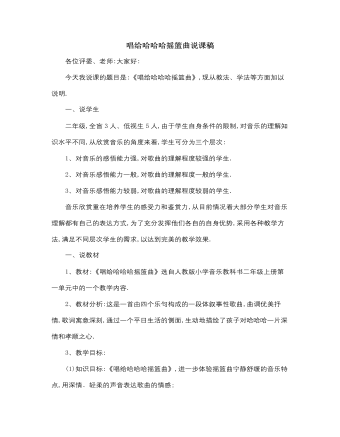
人音版小学音乐三年级上册唱给哈哈哈摇篮曲说课稿
(4)演一演视障生由于生理缺陷,在他们的头脑中很难形成动作形体概念,用情景教学法,使学生身临其境,要求他们不一定按歌曲要求的动作表现,只需要他们把那种对音乐的理解用自己的方式表现出来,边听音乐边表演.通过这样的训练,提高学生的肢体语言能力,同时能大胆发挥想象,做自己对音乐理解的动作,通过动作使其更深刻的理解歌曲.对于低视生让他们通过看课件及对歌曲的理解,创遍简单的舞蹈动作,使其与歌曲的情节相融合,更深刻的体味歌曲内涵.(5)复听歌曲一遍让学生仔细的听乐曲,感受乐曲所带给的独特感受,让他们融入到乐曲中,展开想象,发展他们的空间想象力和创造力,同时提高他们的鉴赏水平.六、课堂小结感谢从小养育我们的父母;感谢一直关心着我们的父母;感谢为我们而操劳的父母……要感谢的太多太多了,就让我们怀着一颗感恩的心,报答我们的父母吧!
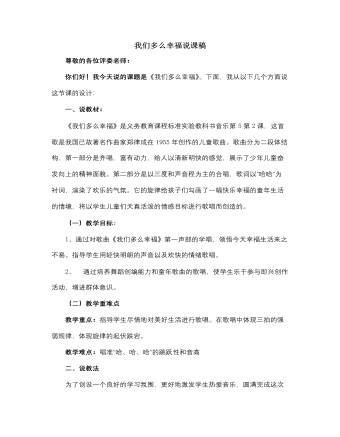
人音版小学音乐三年级上册我们多么幸福说课稿
教师有感情的教唱歌曲,学生感受歌曲的情绪、节奏、节拍的同时跟着学唱。在这基础上学唱歌词,随琴听唱,要求注意 3/4 拍的强弱规律, 请同学们打拍子随老师一起唱,再组织同学们积极参与课堂活动,教师给予评价。(3)随歌起舞美的旋律、美的歌词更需要美的舞姿。为了激发音乐学习兴趣,我在本歌曲完全好以后,让学生们用舞蹈来表现歌曲,组织学生通过自主合作、互相启迪、探讨来再现歌曲并进行歌舞创编。教师给予启发和指导舞蹈动作,强化老师参与者和合作者的身份,体现师生融洽关系。(三)总结同学们这节课开心吗?这样的学习生活幸福吗?那我们要珍惜这份幸福,让我们再次唱响幸福,为幸福喝彩。(播放歌曲,让学生听着或唱着,带着愉快的心情去享受课间活动的快乐。)
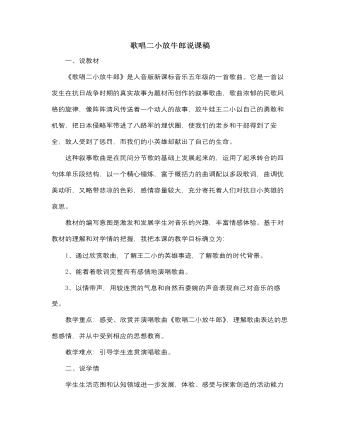
人音版小学音乐五年级上册歌唱二小放牛郎说课稿
一、说教材《歌唱二小放牛郎》是人音版新课标音乐五年级的一首歌曲。它是一首以发生在抗日战争时期的真实故事为题材而创作的叙事歌曲,歌曲浓郁的民歌风格的旋律,像阵阵清风传送着一个动人的故事,放牛娃王二小以自己的勇敢和机智,把日本侵略军带进了八路军的埋伏圈,使我们的老乡和干部得到了安全,敌人受到了惩罚,而我们的小英雄却献出了自己的生命。这种叙事歌曲是在民间分节歌的基础上发展起来的,运用了起承转合的四句体单乐段结构,以一个精心锤炼,富于概括力的曲调配以多段歌词,曲调优美动听,又略带悲凉的色彩,感情容量较大,充分寄托着人们对抗日小英雄的哀思。教材的编写意图是激发和发展学生对音乐的兴趣,丰富情感体验。基于对教材的理解和对学情的把握,我把本课的教学目标确立为:1、通过欣赏歌曲,了解王二小的英雄事迹,了解歌曲的时代背景。
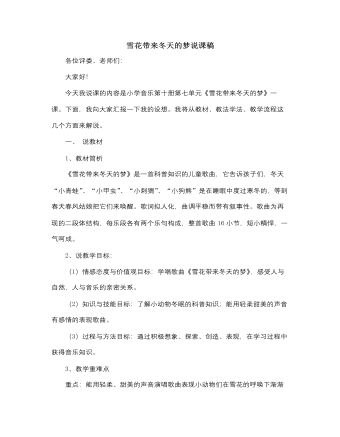
人音版小学音乐五年级上册雪花带来冬天的梦说课稿
(三)实践操作,表现歌曲。课标中指出,“表现是实践性很强的音乐学习领域,是学习音乐的基础性内容,是培养学生音乐表现能力和审美能力的重要途径。”再加上对于这个年龄段的学生来讲,他们特别喜欢表现自己,所以,我充分发挥集体的力量,设计“小小音乐家”的教学环节,让同学们在小组中合作学习,采用不同形式演唱、用打击乐器伴奏、歌舞表演等形式将唱、奏结合,唱、演结合,巩固学生对歌曲的学习,体验合作学习的快乐,养成学生共同参与的群体意识和相互尊重的合作精神和实践能力,这也更体现了课标中音乐课程价值所提出的要培养学生的“社会交往价值”。(四)拓展延伸,创编歌曲。课标中的“文化传承价值”中明确提出:“要让孩子们通过学习世界上其他国家和民族的的音乐文化,拓宽他们的审美视野,认识世界各民族音乐文化的丰富性和多样性,增进对不同文化的理解、尊重和热爱。”

